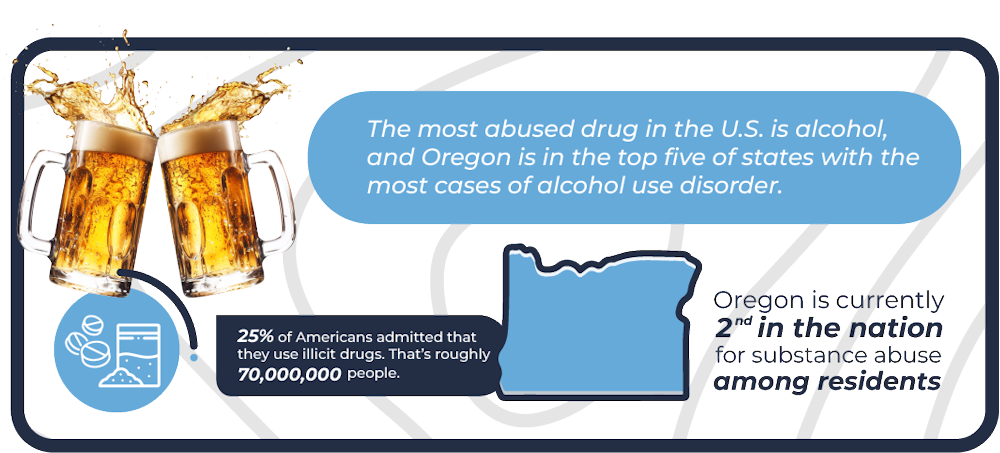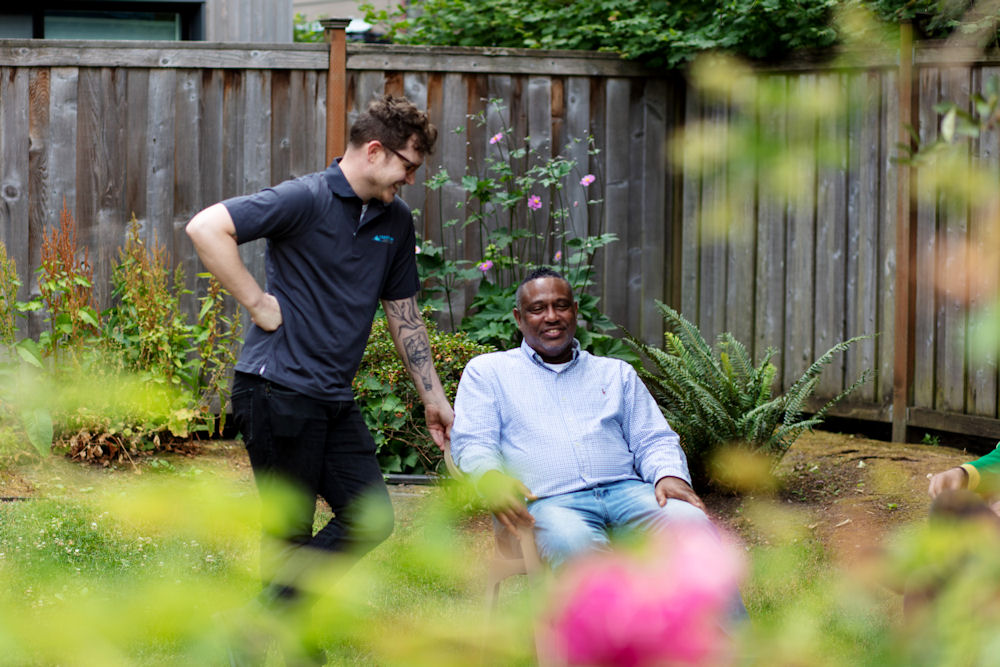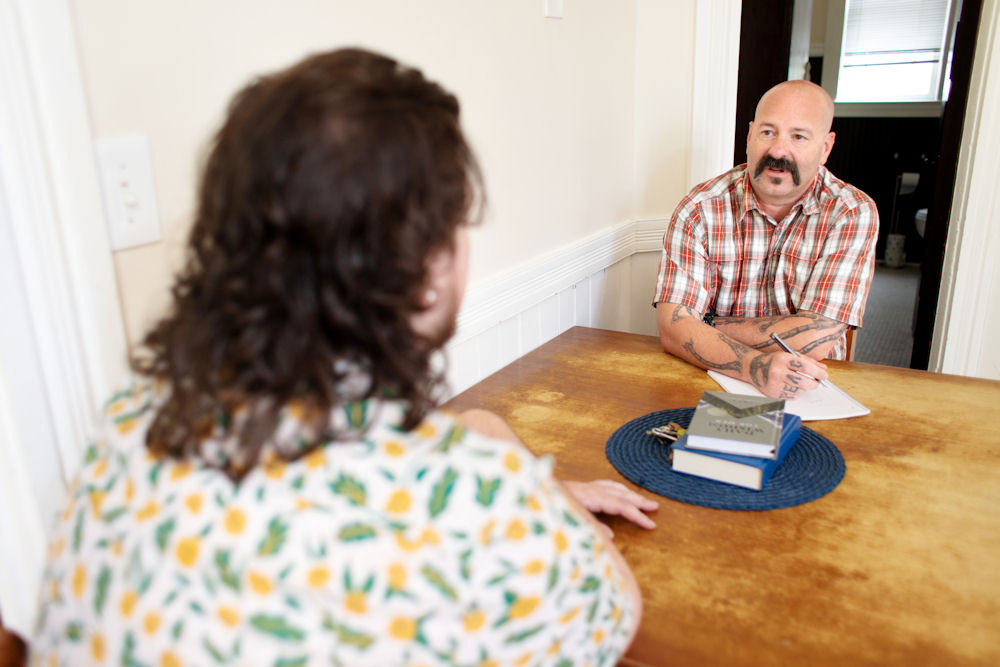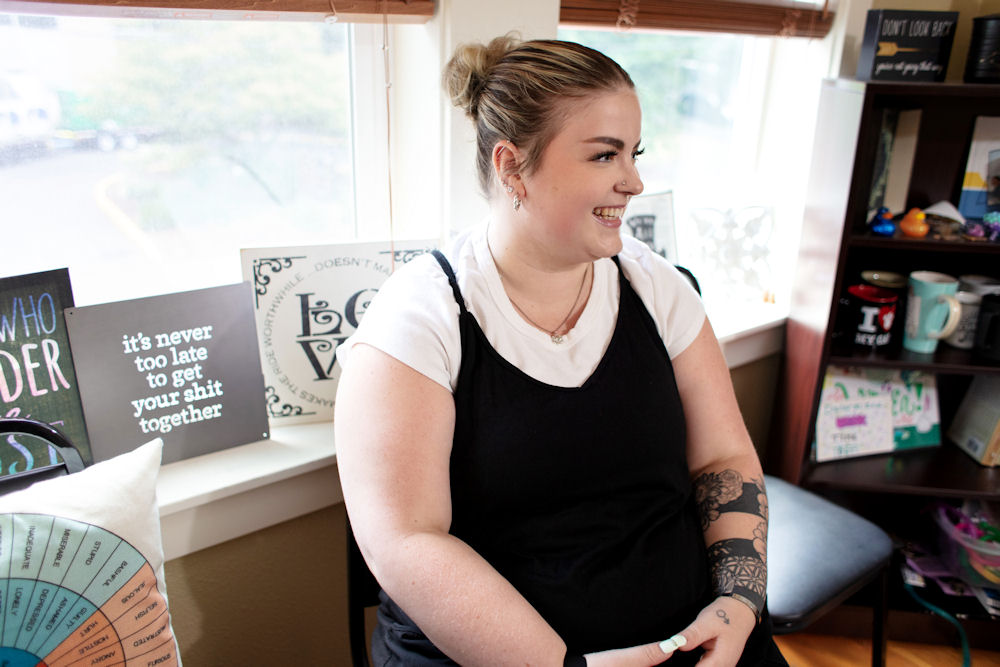At Crestview Recovery, we offer comprehensive addiction services tailored to each client’s unique needs, including outpatient, intensive outpatient, residential, and mental health treatment services.

Statistics have shown that those who suffer from the disease of addiction need to be carefully transitioned through different levels of care in order to have the best chance of staying sober. That’s exactly what you’ll receive at Crestview Recovery in Portland, Oregon.

The State of Mental Health in America Report shows that Oregon is 2nd in the nation for substance abuse among residents.
The most abused drug in the U.S., according to SAMSHA, is alcohol. Oregon is in the top five of states with the most cases of alcohol use disorder.
Healing Begins Here
Residential Treatment Program In Oregon
Our Portland residential program offers comprehensive care for both drug and alcohol rehab. Individuals can focus their entire attention on healing and returning to wellness. Distractions, triggers, and stressors are all removed. Working alongside counselors, therapists, and other addiction treatment professionals, a customized plan can be developed to identify and meet every person’s recovery goal. Typically, inpatient treatment lasts for 30 days But, in some cases, it can go longer to ensure the patient receives complete care. We offer 90-day treatment and 60-day treatment options as well.

Outpatient Addiction Treatment Programs
The American Society of Addiction Medicine (ASAM) has established five levels of addiction care:
- Level 0.5: early intervention
- Level I: outpatient services
- Level II: intensive outpatient/partial hospitalization services
- Level III: residential inpatient services
- Level IV: medically-managed intensive inpatient services
At Crestview Recovery Center we offer most of these levels of care. Our outpatient services include partial hospitalization, intensive outpatient, and IOP for mental health.
A partial hospitalization program (or PHP) is a useful step in addiction recovery. Many people who enter addiction treatment programs need to go into the partial hospitalization program once the withdrawal is over. While you’re in the partial hospitalization level of care, you’ll be able to focus on your recovery without the stressors from the outside world. Medication management is a part of the comprehensive addiction treatment services offered, ensuring that clients receive the necessary medication assistance as part of their overall wellness and treatment plan.
Once you’ve completed the partial hospitalization program, you will be able to transition to the outpatient treatment program. Outpatient is where you can continue to get the treatment you need while integrating back into daily life. These types of programs provide a flexible and supportive framework for recovery, allowing individuals to continue their treatment while managing their daily responsibilities. The support you need will be there through Crestview Recovery to help you navigate your newfound sobriety.
Intensive outpatient treatment for addiction is a comprehensive program that provides in-depth care without requiring a residential stay. It begins with an assessment to develop a personalized treatment plan. The program includes individual therapy to address personal issues, group therapy for peer support, and family therapy to improve communication.
Educational workshops cover addiction, coping strategies, and relapse prevention while skill-building activities enhance life skills and emotional regulation. Medical support is available for medication management and treating co-occurring conditions. Frequent drug testing and progress reviews ensure accountability. Patients typically attend multiple sessions weekly, balancing rigorous treatment with daily responsibilities.
Crestview Recovery is one of the few rehab facilities in the Portland area that are licensed to provide mental health treatment. Our intensive outpatient program for mental health offers structured treatment plans designed to support young adults experiencing significant emotional or psychological challenges, while allowing them to maintain their daily routines. This program also provides therapy sessions, both individual and group, medication management, and psychoeducational support.

MENTAL HEALTH TREATMENT
- Anxiety
- Depression
- Trauma
- PTSD
- Personality disorders
- Bipolar disorder.
Our program provides a multifaceted approach, incorporating individual therapy, group sessions, and medication management to ensure personalized care for each patient. Our team of highly trained professionals, including psychiatrists, psychologists, and licensed therapists collaborates to create treatment plans tailored to each individual that emphasize holistic healing and long-term recovery.
We integrate evidence-based therapies such as cognitive-behavioral therapy (CBT), dialectical behavior therapy (DBT), and trauma-focused therapy, equipping our patients with the tools and support they need to navigate their mental health journeys. By fostering a compassionate and supportive environment, we aim to empower individuals to achieve mental well-being and lead fulfilling lives.
Dual Diagnosis Program

Addiction Therapy Programs
The individual therapy at Crestview Recovery provides clients with one-on-one sessions with a licensed therapist, focusing on personalized treatment plans that address specific mental health and addiction issues. This approach allows clients to explore their unique challenges and develop coping strategies tailored to their individual needs.
Facilitated by a trained therapist, group therapy offers a supportive environment where clients can share their experiences and learn from others facing similar challenges. These sessions help build a sense of community and foster peer support, essential components in the recovery process.
Family therapy is crucial in addressing the impact of addiction on the entire family and promoting a supportive home environment. This therapy involves the client and their family members in joint sessions aimed at improving communication, resolving conflicts, and strengthening relationships.
Cognitive-behavioral therapy (CBT) is an evidence-based approach that helps clients identify and change negative thought patterns and behaviors. Through CBT, clients develop practical skills to manage triggers, reduce relapse risk, and improve overall mental health.
Dialectical Behavioral Therapy (DBT) combines cognitive-behavioral techniques with mindfulness practices to help clients regulate emotions, tolerate distress, and improve interpersonal relationships. DBT is particularly effective for individuals struggling with intense emotions and self-destructive behaviors.
Trauma therapy focuses on addressing and healing the psychological and emotional impacts of traumatic experiences. This therapy helps clients process their trauma in a safe environment, reducing symptoms of PTSD and promoting long-term recovery.
Non-traditional treatment methods such as yoga, meditation, and acupuncture to support overall well-being all come together in the form of holistic therapy. By addressing the connection between mind, body, and spirit, holistic therapy aims to enhance the recovery journey and improve the quality of life for individuals.
Continuing Care
Aftercare programming is vital to prevent relapse. The vast majority of individuals aren’t able to maintain their sobriety alone. Thus, relapse prevention is a significant part of aftercare. Building or belonging to a supportive community decreases your risk of relapse. It also affords you the opportunity to make progress in your new sober life. Many times, individuals find themselves caught not knowing where to go after treatment. Although they are now sober, their regular daily lives may now be riddled with triggers and bad influences.
Once you’ve beaten addiction, you’re already in a good position to stay sober. Something to consider as you transition back to your everyday life, what are you going to do with your time? One answer is to get involved with the sobriety community. You can find recovery groups in the area to spend time with and seek volunteer opportunities to give back to the community.

– Payton V.
AFTERCARE OPTIONS FOR A LASTING RECOVERY
- Give you a venue to develop positive sober friendships
- Receive support and motivation to help you maintain your sobriety plan
- Reduce stress or anxiety by goving you opportunities to speak with others who understand your situation
Sober Living Housing in Portland
The transition back to independent living isn’t easy. Individuals may have to cut friends and family who are negative influences out of their new sober life . Sometimes, individuals even need to change where they live and work to avoid triggers and risky situations. This is why sober living homes are useful. They provide a means to practice the skills and techniques learned in treatment in a safe, controlled environment.
Sober living homes also provide structure. Many individuals come out of treatment and need a refresher on how to go about daily tasks. This is because many people neglect self-care and forget about how to take proper care of themselves in the throes of addiction. Sober living allows individuals to re-learn that responsibility. It also gives them the chance to be supportive of others, and discovers just how important sharing the load is.
Crestview Recovery also offers comprehensive recovery programs to support lasting recovery. These programs include a wide range of mental health services to address the whole client.
Resources for Families
Crestview Recovery also offers a family program to help foster the feeling of belonging and to help build a family environment conducive to continued recovery. Our family program is here to help you and your loved ones begin to mend and strengthen these relationships. Your loved ones need to learn about the disease of addiction, so they can provide you with additional support.
CRESTVIEW DRUG AND ALCOHOL REHAB IN PORTLAND, OR
Specialized Programs
Providing comprehensive and truly individualized care includes providing access to specialized programs. Crestview Recovery has helpful resources and tailored services to meet individual needs, including:
- Women’s Rehab: Our women’s rehab program offers specialized addiction treatment services tailored to the unique needs of women, incorporating group therapy, peer services, and relapse prevention strategies to support their recovery journey.
- Men’s Rehab: The men’s rehab program provides comprehensive substance abuse treatment, including both inpatient and outpatient options, medication management, and withdrawal management to address the specific challenges men face in their recovery process.
- Young Adult Rehab: Our young adult rehab program focuses on addressing the unique substance use and mental health challenges of young adults, offering a full continuum of care that includes counseling, education, and supportive resources to help them develop healthy coping tools.
- Senior Rehab: The senior rehab program at Crestview Recovery is designed for older adults struggling with addiction, providing age-appropriate treatment services. It includes medication management and physical health support to ensure a safe and effective recovery journey.
- Rehab for LGBTQIA: Our rehab for LGBTQIA specialty program offers a safe and inclusive environment that addresses the specific needs and challenges of LGBTQIA individuals. This is accomplished through tailored addiction treatment programs, peer support, and community recovery resources.
We Accept Most Insurance
We’re in-network with many insurance providers in Oregon, including:
- Moda
- Aetna
- Cigna
- Blue Cross Blue Shield
- Beacon Health Options
- Providence Health Plan
- Shasta Administrative Services
- Government Employees Health Association (GEHA)
- PacificSource Health Plans
- Triwest Healthcare Alliance
- Kaiser Permanente
- First Choice Health
- Magellan
- MultiPlan
We understand that the cost of rehab can often discourage individuals from seeking professional detox and treatment for alcoholism or drug abuse. At Crestview Recovery in Portland, Oregon, we accept health insurance for our addiction treatment services, striving to make rehab accessible to those in need. If you are unsure whether your insurance plan is accepted, our admissions team is here to help. We will review your plan with you and guide you to the appropriate resources for more insurance-specific information.





















